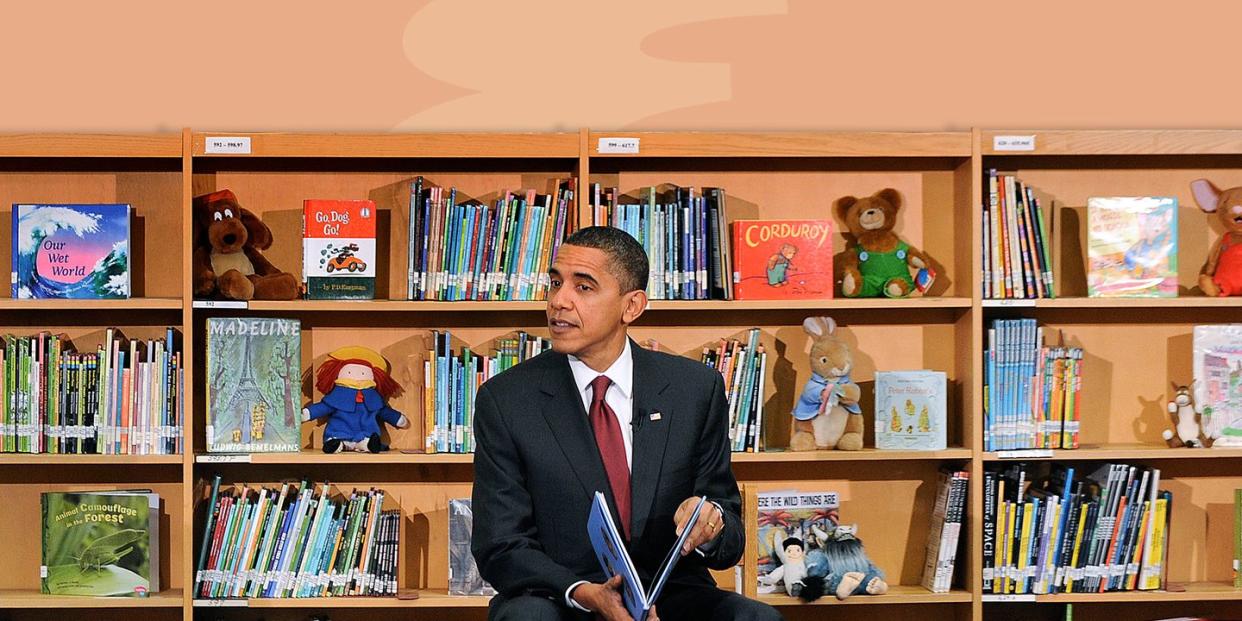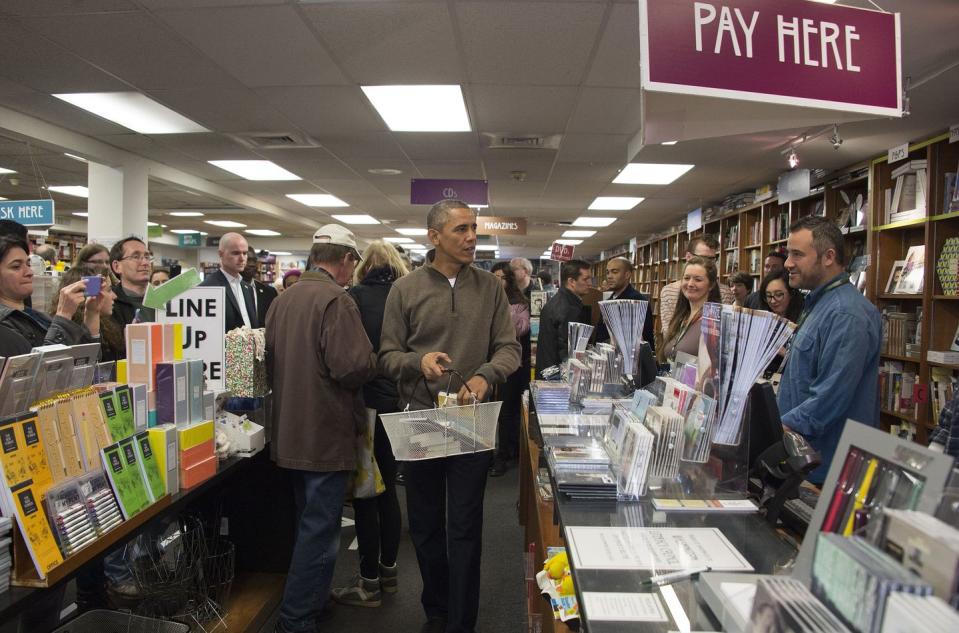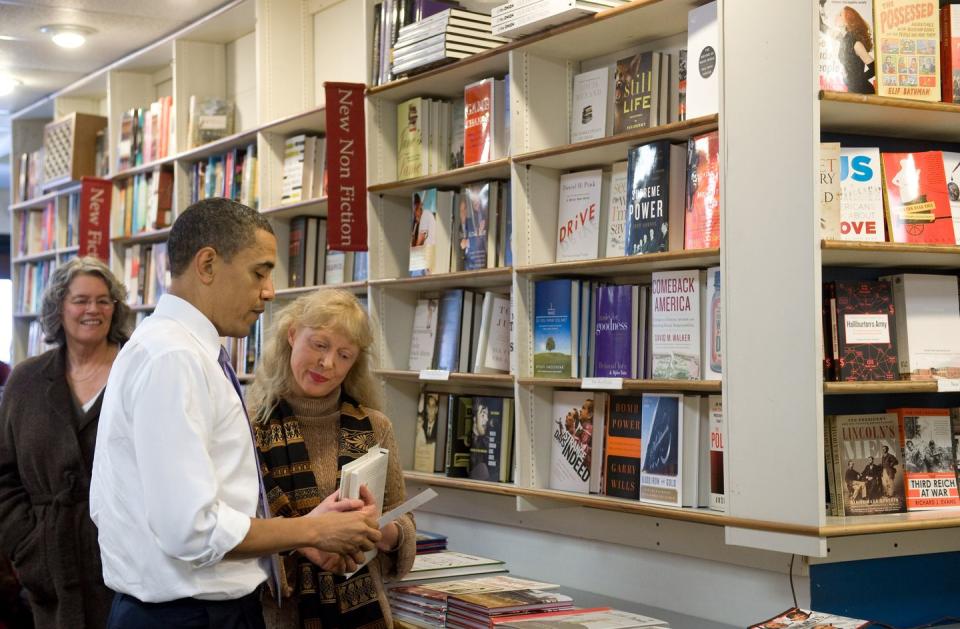Behind the Scenes of Barack Obama’s Reading Lists

- Oops!Something went wrong.Please try again later.
As a journalist covering the book-publishing industry, when an editor reaches out to me about a story, it’s usually because there’s something dark lurking under the cover. The (now failed) Penguin Random House/Simon & Schuster merger was a messy game of corporate maneuvers with the potential to leave employees and authors in the dust. The New York Times best-seller list is calculated with a secret formula that authors and publishers regularly attempt to cheat.
I usually have anonymous sources falling all over themselves to spill industry secrets, so you can imagine that when I was assigned to investigate the methodology behind Barack Obama’s annual lists of book recommendations, I set out to expose a secret apparatus of industry shenanigans. What I found was much more shocking.
President Barack Obama released his first official list of book recommendations in summer 2009, a few months after taking office. He continued to share summer reading recommendations throughout his presidency, with the exception of 2012 and 2013, when one can imagine he was swept up in his day job. In 2017, after leaving office and undoubtedly regaining some free time for leisure reading, the former president also began releasing a best-books-of-the-year list, alongside similar roundups for movies, television, and music.
For some, Obama’s recommendations have become highly anticipated. Julianne Buonocore, founder of the book and lifestyle blog The Literary Lifestyle, said that she and her 800,000+ monthly readers eagerly await Obama’s book list each year. “First, it’s exciting to see which books you’ve read that a former president has read too, and second, he always offers an array of diverse reads, so you know you’re also bound to find something new and impactful to read next,” Buonocore said.

Although the lists are generally well received among anyone not naturally inclined to hate Barack Obama for unrelated political reasons, not everyone believes the authenticity of his recommendations. “I do not think the list is entirely real, in that he actually sits down and reads all these books and then chooses his favorites,” said Grace Astrove, bookstagrammer and director of development at Magazzino Italian Art. “I think he does read, of course, but with his schedule and responsibilities, there’s just no way. It seems more likely that the highly curated list is put together from his team’s suggestions, and then they all work to choose the best ones that correspond with his important agenda or other trends happening in the world.”
For skeptics like Astrove, there’s the looming question of whose influence impacts Obama’s selections. Sources I spoke to in the publishing industry were quick to distance themselves from the insinuation that they play any role in it. When asked whether they pitch books to the former president’s team for consideration, Carisa Hays, vice president, director of publicity at Random House Publishing Group (and Obama’s in-house publicist for his own books), responded, “The books that he chooses for his annual reading list are all his personal choices, and as a publisher we don’t influence his choices. His choices are his own.”
Random House, as well as the other publishers I reached out to, declined to comment on whether or not they’ve ever pitched a book to Obama for consideration. Still, it’s hard to imagine that any publicist with the opportunity to get their book into the hands of the former president doesn’t try. Given the lucrative boost in sales and publicity that an Obama pick would no doubt confer, why wouldn't they?
Eric Shultz, who was a senior advisor and deputy press secretary to President Obama, says that emails from book publicists have “no bearing on what he chooses to read and release as part of his reading list.” Rather, Obama’s taste “is a reflection of the inputs he has.” When pressed, Schultz was adamant that those who suspect the former president of outsourcing his recommendations are misguided. While Shultz freely admits that staff members contribute to planning the announcements and creating promotional elements like social-media graphics, he said, “these lists come from him. This is not a staff-led exercise, and I think if it was, it wouldn’t pass the smell test. These lists wouldn’t be as salient or get as much traction if it wasn’t coming from him directly.”
According to Schultz, the richness of Obama’s reading recommendations are a reflection of the man himself and his community. You don’t need The New York Times Book Review or Susie from book club to get recommendations when you’re constantly surrounded by some of the most interesting people in the world. As Schultz pointed out, “Being a former president, one of the perks is access to people and communities and stories from every corner of the planet, in every industry, in every sector, in every vector… Whether it’s people in business or sports or his daughter or other friends, these are all people that he hears about books from.”
The titles that Obama selects are incredibly diverse both in subjects and in authors, varying widely from the boring political tomes written by old white men that you might imagine dwelling on the nightstands of former presidents. Of the 13 titles included in Obama’s Favorite Books of 2022, there are nine works of fiction and four works of nonfiction, including books by eight women and eight BIPOC authors. There’s a novel about a dystopian school for mothers; a graphic novel about labor and survival in Canada; a journey through the history, rituals, and landscapes of the American South; and a beautifully crafted short-story collection. As someone who spent the better part of a decade working in Big Five book publishing (the five largest publishing houses: Penguin Random House, HarperCollins, Simon & Schuster, Macmillan, and Hachette), I can tell you that the former president has impeccable taste.
It’s easy to imagine certain celebrity-book-club teams setting representation quotas to avoid potential Internet backlash, but according to Schultz, Obama “releases lists that are not monolithic because his actual reading diet isn’t, either. It’s simply a reflection of what he is reading and not necessarily a check-the-box exercise or anything like that.”
No one I reached out to for this story had any information that would contradict Schultz’s assertions.
According to the authors I spoke with whose books have appeared on Obama’s lists of summer and end-of-year recommendations, the news came as a huge surprise. Rumaan Alam, whose novel Leave the World Behind was on the summer 2021 list, said that when he found out, his reaction was “disbelief.” Alam said, “I had no idea that my book would be on this list—I was at the beach with my kids and a friend texted me saying ‘Congratulations.’ I had no idea what he was referring to—but what a wonderful surprise.”
For New Yorker staff writer Patrick Radden Keefe, the shock of landing on Obama’s list has come not once but twice—a not uncommon occurrence among the former president’s presumed favorite authors, such as Emily St. John Mandel (author of The Glass Hotel, listed in 2020, and Sea of Tranquility, listed in 2022) and Colson Whitehead (author of The Underground Railroad, listed in 2016, and Harlem Shuffle, listed in 2021).
“I had no inkling in advance, either time,” said Radden Keefe. “With Say Nothing, it hadn’t even occurred to me that the book might be on the list. Then with Empire of Pain, I assumed there was no chance it would make the Obama list because Say Nothing had.” Radden Keefe has a hunch that “the lists aren’t made by committee; it’s one guy’s reading habits, albeit a guy who reads pretty widely, is an immensely gifted writer himself, and happens to be the former president of the United States.”
Having previously run social media for a Big Five book publisher, I can add that we were never told of the president’s selections in advance—something that often happened for major celebrity-book-club announcements or awards, in order for us to prepare marketing and public-relations materials.
The question of how the most powerful man on the planet found time to read Fates and Furies amid major world events like the Arab Spring and the killing of Osama bin Laden is a perfectly valid reason for skepticism—the guy was and is busy!—but Schultz says Obama found time to read because he sees reading as necessary, and he makes it a priority on his schedule. “He considered [reading] part of being a good leader, part of being a good president, part of being a good father, a good husband, and a good man,” Schultz said.

Obama has echoed this sentiment throughout his career. In a 2017 interview with The New York Times’s then chief book critic, Michiko Kakutani, on what books mean to him (that interview’s sheer existence is proof of him prioritizing books and reading while in office), Obama shared how he loved reading as a child and rediscovered reading and writing in college and as a way to rebuild himself. When he moved to New York City as a young man in the early 1980s, he said, books “reintroduced me to the power of words as a way to figure out who you are and what you think, and what you believe, and what’s important.”
As a politician, he’s constantly placed an emphasis on the power of books to bring us together. Schultz explains, “At his core, Barack Obama is a storyteller, and he puts enormous weight on how these authors and artists tell stories through books, music, or television and film. He especially values stories that reflect our ideals, our hopes, our dreams, our challenges, our opportunities.”
Regardless of whether the former president gets help compiling his recommendations or whether he accepts the occasional pitch from a former staffer’s book publicist, the fact that he promotes reading at all is a big win for anyone who believes in the power of books to bring us together.
Astrov, albeit skeptical that a president would be able to prioritize reading while in office, still gushed about how much she enjoys Obama’s annual recommendations. “Regardless of if it is real,” she said, “it is very significant and so wonderful to have an influential, male, BIPOC role model who promotes reading to millions. The list is effective in so many ways; I don’t necessarily care how it is created.”
The feeling of connection between two people who love the same book is not one often felt between ordinary citizens and high-ranking government officials, but I can honestly say that when Obama announced Lauren Groff’s achingly beautiful novel Fates and Furies—my favorite book of 2015—as his favorite book of 2015, I felt I learned more about him as a person than I had from any profile, speech, or campaign ad.
Imagining that a political consultant might have picked that book for him broke my heart, but it turns out I didn’t need to worry. After weeks of reaching out to publishers, authors, and book insiders, I could not find a single source with knowledge that the former president’s book recommendations are engineered by anyone other than himself. I may have set out to write an exposé, but what I found was so much more shocking: a positive publishing story filled with authenticity.
For one moment, I give you permission to forget about book bans, unlivable industry salaries, and diversity problems. For one minute, I give you permission to be grateful that one of the most influential people on the planet makes it a priority not just to promote books but to be personally moved by them.
I, for one, can’t wait to find out what he’s reading this summer.
You Might Also Like

